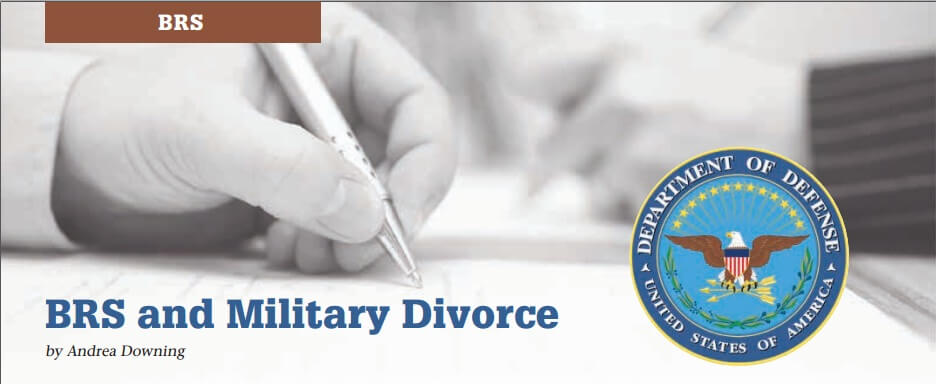by Andrea Downing
The new Blended Retirement System goes into effect Jan. 1, 2018, bringing huge changes to the entire military retirement system. The BRS not only will affect the retirement system, but other aspects of the military, as well. AmeriForce Media and Military Families Magazine are taking a closer look at the BRS system and how it can affect your military family. In this issue, we take a look at how the new system may affect divorce settlements in the military.
One of the nation’s legal experts on military divorce predicts the military’s new blended retirement system (BRS) will be “one more Excedrin headache” for lawyers handling military divorce cases and a potential landmine for some former spouses of military personnel.
While military divorce rates are dropping to levels only slightly lower than their civilian counterparts — 3.1% compared to a civilian divorce rate of 3.2%, according to the most recent 2014 data — military couples face unique challenges in both marriage and divorce.
Mark Sullivan, a retired Amy Reserve JAG colonel who now practices family law in Raleigh, N.C., believes the BRS will add another layer of complexity to already complex military divorces cases. Such cases can have significantly different results depending on the state where the divorced is filed, and there are unique rules for dividing pensions, serving divorce papers, setting support and enforcing it.
Here is what’s changing:
When the BRS goes into effect on Jan. 1, 2018, eligible service members will receive automatic and matching Thrift Savings Plan (TSP) contributions and mid-career continuation incentive bonuses as well as a reduced traditional military pension if they serve 20 years or more. Active duty members with fewer than 12 years of service and members of the reserve component with fewer than 4,320 retirement points will be eligible to opt-in to BRS or remain under the current “legacy” retirement system. The BRS opt-in decision must be made by the end of the calendar year in 2018.
Once enrolled in the BRS, current members immediately will receive automatic 1% and up to 4% DoD matching contributions to their TSP. Those joining the military in 2018 will become eligible for 1% automatic contributions from the DoD after 60 days of service. Service members will be fully vested — meaning they keep all contributions — at the beginning of their third year of service. The automatic and matching contributions end when a member reaches 26 years of credible service.
Sullivan says implementation of the BRS will be headache-inducing for divorce lawyers because military spouses who have divorced in 2017 and been awarded a marital portion of a service member’s future military pension may be “completely clueless” as to the impact of the BRS on their divorce settlement.
“The old standard that if you retire at 20 years, you get 50% of your High- 3 base pay is no longer valid,” he explains. “You get 40%, not 50%.”
In addition, Sullivan, author of a guide for lawyers called The Military Divorce Handbook, believes former spouses who divorce before 2018 will not have a legal right to any part of the defined contribution TSP, which will include automatic and matching DoD contributions.
“First, we have a new benefit (the defined contribution TSP) that wasn’t divided in the divorce settlement since it didn’t even come into existence until Jan. 1,” Sullivan explains. “Thus, Jane Doe, the former spouse, has no claim to it since it isn’t marital property. In addition, Jane will get no notification about the service member, John Doe, opting into the BRS. And she certainly doesn’t have a veto over whether John makes that choice. The opt-in decision causes a reduction in the multiplier and she won’t know it. That’s why she will be clueless.”
Other Considerations
Other aspects of the BRS may affect divorce cases as well. The mid-career continuation bonus could impact spousal and child support payments.
Read comments







































